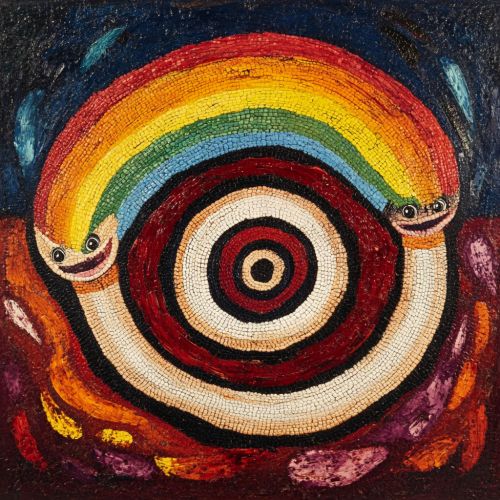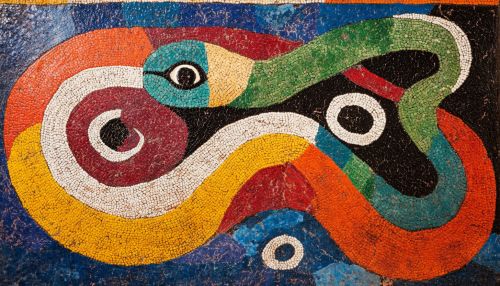Rainbow Serpent: Difference between revisions
No edit summary |
No edit summary |
||
| Line 2: | Line 2: | ||
The Rainbow Serpent is a prominent figure in the mythology of Indigenous Australian cultures. This mythological being is often associated with creation, fertility, and the natural world. The Rainbow Serpent is a central figure in the Dreamtime, the Aboriginal understanding of the world's creation and the spiritual framework that underpins their culture and beliefs. | The Rainbow Serpent is a prominent figure in the mythology of Indigenous Australian cultures. This mythological being is often associated with creation, fertility, and the natural world. The Rainbow Serpent is a central figure in the Dreamtime, the Aboriginal understanding of the world's creation and the spiritual framework that underpins their culture and beliefs. | ||
[[Image:Detail-98259.jpg|thumb|center|Depiction of the Rainbow Serpent in Aboriginal art.]] | [[Image:Detail-98259.jpg|thumb|center|Depiction of the Rainbow Serpent in Aboriginal art.|class=only_on_mobile]] | ||
[[Image:Detail-98260.jpg|thumb|center|Depiction of the Rainbow Serpent in Aboriginal art.|class=only_on_desktop]] | |||
== Mythological Significance == | == Mythological Significance == | ||
Latest revision as of 20:48, 8 October 2024
Introduction
The Rainbow Serpent is a prominent figure in the mythology of Indigenous Australian cultures. This mythological being is often associated with creation, fertility, and the natural world. The Rainbow Serpent is a central figure in the Dreamtime, the Aboriginal understanding of the world's creation and the spiritual framework that underpins their culture and beliefs.


Mythological Significance
The Rainbow Serpent is considered a creator god and a symbol of fertility and life. It is believed to have shaped the landscape, creating rivers, mountains, and other natural features. The serpent is often depicted as a long, sinuous creature with rainbow-colored scales, representing the connection between water and life.
Creation Myths
In many Aboriginal cultures, the Rainbow Serpent is credited with creating the world during the Dreamtime. According to these myths, the serpent emerged from the earth and began to move across the land, forming rivers, mountains, and valleys. The Rainbow Serpent is also said to have created the first people and taught them how to live in harmony with the land.
Fertility and Life
The Rainbow Serpent is closely associated with water, which is essential for life. In many stories, the serpent is responsible for bringing rain and ensuring the fertility of the land. The Rainbow Serpent is also seen as a protector of the environment, maintaining the balance between humans and nature.
Cultural Variations
The Rainbow Serpent is a common figure in many Aboriginal cultures, but its representation and significance can vary widely. Different tribes have their own stories and interpretations of the Rainbow Serpent, reflecting the diversity of Indigenous Australian cultures.
Northern Australia
In Northern Australia, the Rainbow Serpent is often associated with the monsoon season and the wet-dry tropical climate. The serpent is believed to control the rains and ensure the fertility of the land. In some cultures, the Rainbow Serpent is also seen as a guardian of sacred sites and a protector of the people.
Central Australia
In Central Australia, the Rainbow Serpent is often associated with the arid landscape and the importance of water sources. The serpent is believed to have created the underground water systems that sustain life in the desert. The Rainbow Serpent is also seen as a symbol of the interconnectedness of all living things.
Symbolism and Representation
The Rainbow Serpent is a powerful symbol in Aboriginal culture, representing the connection between humans and the natural world. The serpent is often depicted in Aboriginal art, with its sinuous form and rainbow-colored scales symbolizing the flow of water and the cycle of life.
Art and Iconography
The Rainbow Serpent is a common motif in Aboriginal art, appearing in paintings, carvings, and other forms of artistic expression. The serpent is often depicted in a stylized form, with its body winding across the canvas or carving. The use of vibrant colors and intricate patterns reflects the importance of the Rainbow Serpent in Aboriginal culture.
Rituals and Ceremonies
The Rainbow Serpent is also an important figure in Aboriginal rituals and ceremonies. These ceremonies often involve songs, dances, and other forms of performance that tell the story of the Rainbow Serpent and its role in the creation of the world. The ceremonies are a way of maintaining the connection between the people and the land, and ensuring the continued fertility and prosperity of the community.
Modern Interpretations
The Rainbow Serpent continues to be a powerful symbol in contemporary Aboriginal culture. It is often used in art, literature, and other forms of cultural expression to represent the connection between humans and the natural world. The Rainbow Serpent is also seen as a symbol of resilience and survival, reflecting the enduring strength of Indigenous Australian cultures.
Environmental Symbolism
In modern times, the Rainbow Serpent has also become a symbol of environmental conservation and sustainability. The serpent's association with water and fertility makes it a powerful symbol for efforts to protect the natural environment and ensure the sustainable use of resources.
Cultural Revival
The Rainbow Serpent is also an important figure in the cultural revival of Indigenous Australian traditions. Many Aboriginal communities are working to preserve and revitalize their cultural heritage, and the Rainbow Serpent is a central figure in these efforts. The serpent's stories and symbolism are being passed down to new generations, ensuring the continued vitality of Aboriginal culture.
